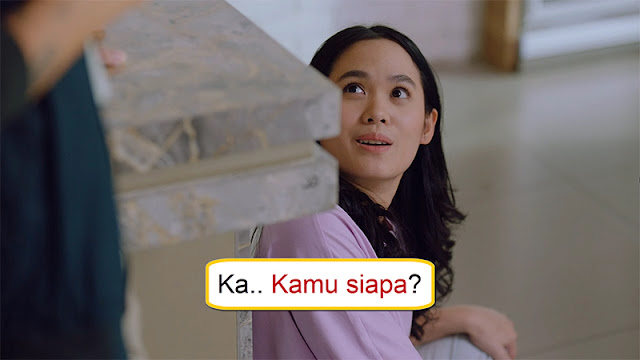- Get link
- X
- Other Apps
Posted by
Iman Prabawa
on
- Get link
- X
- Other Apps
Halo, ketemu lagi sama saya, Iman Prabawa. In this article, I want to talk to you about how to say [who are you?] in Indonesian. As always, you will see clips taken from movies and whatnot spoken by Indonesians to see how Indonesians say it.
If you have any questions regarding the Indonesian language, you can ask me directly. You can see how to do that on my About Me page.
If you are a beginner in the Indonesian language, you can learn step by step with My Lesson Here.
So, without further ado, let's dive in!
Who Are You? In Indonesian
We will learn from the very formal to the most informal you will hear spoken on the street in Indonesia.
1. The most formal way of saying [Who are you?] in Indonesian is,
Anda siapa?
And here is how you pronounce it.
If you use the word [Anda], it will sound so distant to the person you are talking to. [Anda] is usually used in a very formal situation or to strangers you don't want to be close to.
The word order can be switched from [Anda siapa?] to [Siapa Anda?], and both are grammatically correct.
2. You can change [Anda] into [kamu], and it becomes,
Kamu siapa?
And here is how you pronounce it.
You can also switch the word order from [Kamu siapa?] to [Siapa kamu?], but [Siapa kamu?] sounds a little bit impolite.
3. You can use [loe] if you are in Jakarta and the city's surroundings. This is the most informal that you can use.
Loe siapa?
And here is how you pronounce it.
The word order can also be switched from [Loe siapa?] to [Siapa loe?].
Examples From Movies
Here are clips from movies where those words are spoken by Indonesians. Every time I find another one, I will put it here.
The first clip is from Hubungi Agen Gue, Season 1, Episode 1 (2023). Let's watch the clip below.
Below is the conversation from the clip above with English translations.
Kamila: Ka.. Kamu siapa? (Who.. Who are you?)
Bima: Kamu siapa? (Who are you?)
Kamila: Tapi aku yang tanya duluan. (But I asked you first.)
Bima: Oh iya ya? Oke, fair enough. Aku Bima, talentnya mba Amel. (Oh, okay. Fair enough. I'm Bima, and Ms. Amel is my agent.)
Kamila: Aku Kamila. Aku asisten barunya mba Amel. (I'm Kamila. I'm Ms. Amel's new assistant.)
Bima: Oh. (I see.)
Kamila: Maaf, aku belum hafal semua talentnya mba Amel. (I'm sorry, but I still don't know all of Ms. Amel's artists.)
Bima: Ngga papa, santai. Asisten baru lagi ya? Berarti kamu asisten yang ke.. (It's okay, relax. You're her new assistant again? So, that makes you..)
Kamila: Tujuh. (Her seventh assistant.)
Bima: Ketujuh. Oke. (Seventh assistant. Okay.)
Kamila: Katanya sih gitu. (That's from what I heard.)
In this scene, as you can see, both of them are saying,
Kamu siapa?
They do not use [Anda] because [Anda] is very formal and rarely used in daily conversation. You can use [Anda] if you want to distance yourself from the person you are talking to because [Anda] is usually used in a formal situation or to a stranger you do not know yet.
Vocabulary From the Scene
[Aku] is informal for [saya] = I. For more about this, you can read my article here, Aku in Indonesian.
[Tanya] = ask.
[Talent] here means artist. Indonesians use the word [talent] to refer to artists and actors. This term is usually used in a production house or an artist agency.
[Baru] = new.
[Hafal] = memorize.
[Santai] = relax, easy.
[Ngga papa] = It's okay, or I'm okay, depending on the situation.
[Tujuh] = seven.
[Ketujuh] = seventh.
Read also: How to Say I Don't Understand in Indonesian
So, that wraps up today's article. If you have any questions, just leave them in the comment section, and I'll be happy to answer them. Thank you very much, and I'll see you soon. Bye now.
- Get link
- X
- Other Apps
Hello, I'm Iman Prabawa a.k.a Pak Guru Iman. I love to share about languages. My Instagram, @iman_prabawa

Comments
Post a Comment